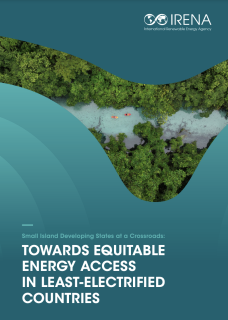
Small Island Developing States (SIDS) account for less than 1% of global greenhouse gas emissions, and yet they are home to some of the world’s most climate-vulnerable populations, making action to mitigate global heating urgent.
The least-electrified SIDS are now at a crossroads to meet universal energy access. Instead of increasing access through imported fossil fuels, they can pursue decentralized renewable energy solutions, with significant economic, well-being, health and environmental gains to be had.
This report focuses on SIDS contexts with significant unelectrified populations that face economic vulnerabilities exacerbated by poverty, food insecurity, water-borne illness, lack of healthcare, volatile agriculture, deforestation and climate vulnerabilities. It offers case studies on Guinea-Bissau, Papua New Guinea and Vanuatu.
